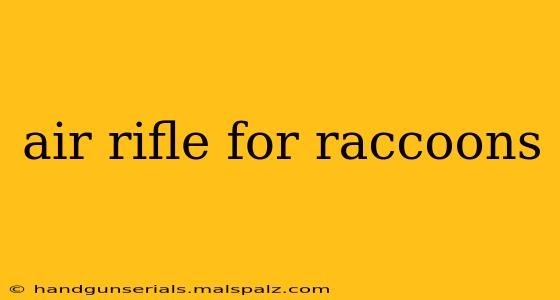Raccoons, while undeniably cute, can quickly become a nuisance, causing significant property damage and posing health risks. If you're dealing with a raccoon problem and considering using an air rifle for control, it's crucial to understand the legal ramifications and choose the appropriate equipment. This guide provides a comprehensive overview to help you make informed decisions. Disclaimer: Always check your local laws and regulations regarding the use of air rifles for pest control before taking any action. Improper use can lead to legal consequences and injury.
Legal Considerations: Know Before You Shoot
Before even considering an air rifle, understand the local laws governing the use of firearms, including air rifles, for pest control. Regulations vary widely depending on location, and using an air rifle illegally can result in hefty fines or even jail time. Some areas may require permits or licenses for air rifle ownership and use, while others may restrict their use within city limits or at night. Thoroughly research your local and state regulations before proceeding.
Choosing the Right Air Rifle Caliber and Power
The effectiveness of an air rifle against raccoons depends heavily on its caliber and power. Raccoons are relatively large and robust animals, requiring a powerful air rifle to ensure a humane and quick dispatch. Here's a breakdown of considerations:
Caliber:
-
.22 caliber: This is generally considered the minimum for raccoon control. It offers a good balance of power and shot accuracy. However, proper shot placement is crucial.
-
.25 caliber: This caliber provides more stopping power than .22 caliber and offers a more reliable kill at longer ranges.
-
.30 caliber: While offering the highest stopping power, .30 caliber air rifles are generally larger, heavier, and more expensive. They are suitable for experienced shooters only.
Power Source:
-
Spring-piston: These are generally less expensive, but require more force to cock and can have some recoil. They are a viable option for close-range shooting.
-
Pre-charged pneumatic (PCP): PCP air rifles are known for their consistent power and accuracy. They offer a smoother shooting experience and are generally more suitable for longer ranges.
-
Gas ram: Gas ram air rifles offer a good compromise between spring-piston and PCP systems. They provide less recoil and smoother operation than spring-piston, but not quite the consistency of PCP.
Ethical Considerations: Humane Dispatch
Using an air rifle for raccoon control requires a commitment to ethical and humane practices. A poorly placed shot can cause unnecessary suffering. Accuracy and precision are paramount. Consider these factors:
-
Shot placement: Aim for the head or heart for a quick and humane kill.
-
Range: Ensure you're within a safe and effective range for your chosen air rifle and caliber. Overestimating your range can result in a wounded animal.
-
Follow-up: If you've missed or made a less-than-lethal shot, be prepared to take appropriate action to ensure the animal is quickly and humanely dispatched. Consult with animal control authorities or experienced hunters if needed.
Alternatives to Air Rifles:
While air rifles can be effective, consider alternatives such as contacting animal control or professional wildlife removal services. These professionals have the experience and tools to safely and humanely remove raccoons from your property.
Conclusion: Responsible Raccoon Control
Using an air rifle for raccoon control requires responsible decision-making, thorough research, and a commitment to humane practices. Always prioritize safety and adhere to local laws and regulations. If you're unsure about any aspect of this process, consult with wildlife control experts before taking action. Remember that alternative solutions often exist, and the safety and well-being of both the animal and yourself should always come first.

